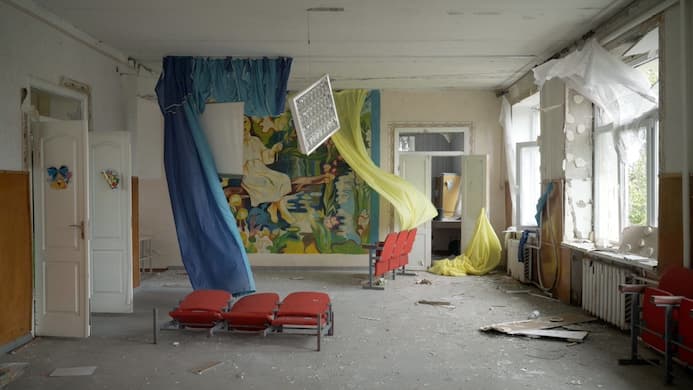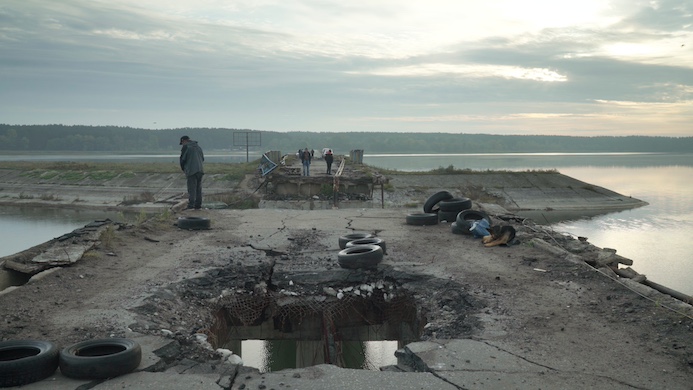A Documentary About Wartime Ukraine, ‘Intercepted’ Is Something of a Must-See — and It Doesn’t Even Have a Distributor
While Oksana Karpovych’s movie fits the bill as a documentary, the overall effect is as much poetic as it is journalistic — albeit poetry of a coruscating sort.

New Yorkers who missed “New Directors/New Films,” an annual event that is a joint effort of Film at Lincoln Center and the Museum of Modern Art, can catch up with individual pictures once they make the rounds of both venues — or so we should hope. Regardless, one movie from the series deserves notice even though it has yet to be picked up for distribution: Oksana Karpovych’s “Intercepted.” It is a singular, shattering venture.
Describing the picture as a documentary is, I suppose, accurate enough. Ms. Karpovych and cinematographer Christopher Nunn trained their camera on the country of Ukraine — its landscape, its people, and the devastation it has sustained due to the Russian invasion, now more than two years ago. There’s no cinematic razzle-dazzle to their approach. “Intercepted” is, essentially, a series of single shots in which movement is at a minimum. When the camera shifts or an edit cuts, they occur with grave purpose.
On these terms, Ms. Karpovych’s movie fits the bill as a documentary. Yet the overall effect of “Intercepted” is as much poetic as it is journalistic — albeit poetry of a coruscating sort. Ambient sounds peculiar to individual vistas provide their own soundtrack, but the other audio components of the film are equally substantive. The brooding electronica of a musician who goes by the moniker NFNR, Olesya Onykiienko, bookends the film and underlines the propulsion of scenes in which we travel along the byways of Ukraine.
Then there’s the sound designer, Alex Lane, whose job, pace Ms. Karpovych, was to “amplify the natural tension that the film already had within that juxtaposition of images and sound.” In print, this description is frustratingly vague; seated in the theater, it makes perfect sense. “Intercepted” sounds not like war as we might imagine it, but, rather, as a continuum of silence. There are moments in which we hear bombs going off and what sounds like gunfire. For the most part, a haunting quiet reigns.
There is a notable exception: voices punctuate the visuals, conversations that were recorded by and subsequently made public by the Security Service of Ukraine. What is it we hear? The click and beep and buzz that are typical of cellphone technology — sounds that take on an increasingly disconcerting character as the film unrolls. Mostly we eavesdrop on calls made by Russian soldiers on the battlefield to their mothers, girlfriends and wives back home.

The voices we hear are people who are loving, anxious, sometimes vindictive, saddled with prejudices, and engaged in circumstances about which they have conflicted feelings. They trade in upsetting observations, telling of actions that are exploitative, egregious, and abhorrent. Much of the dialogue is difficult to stomach. One soldier can’t imagine returning to life as he previously knew it: a newfound capability for torture, he admits with palpable astonishment, has become difficult to resist.
Russian soldiers voice their disaffection for the machinations of Vladimir Putin and confirm their skepticism about the veracity of state media. They repeatedly take note of how well the Ukrainians whose homes they’ve ransacked and destroyed have been living. As for the women to whom they speak: They profess their love even while engaging in casual and sometimes vitriolic bigotries. Not a few are left speechless by what they hear from the men on the front. We are left speechless as well. Ms. Karpovych has crafted a film of unsettling and often brutal delicacy.

